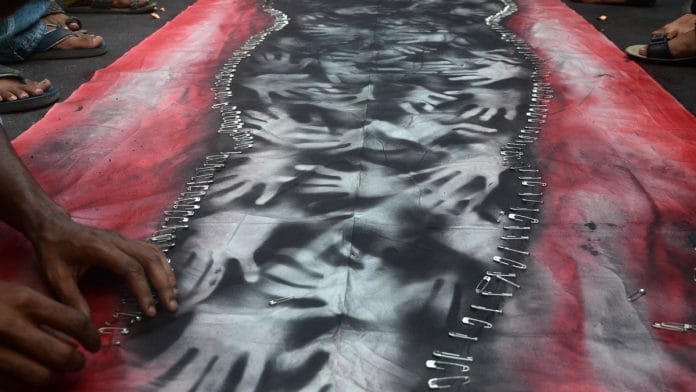Hashtag #WhyIDidntReport makes sense to Indian women raised on izzat and maryada
‘But why didn’t you say anything?’
Any sexual assault survivor will tell you that this is the one question that will inevitably come up in various iterations.
The hashtag #WhyIDidntReport started trending on Twitter over the weekend a little while after US President Donald Trump went on a spiteful rant defending allegations of sexual assault against his Supreme Court nominee, Brett Kavanaugh.
The automatic assumption is that if a woman didn’t report assault immediately, it didn’t really impact her enough. This assumption informs almost all policies and legislation surrounding legal recourse, and more dangerously, the narrative around sexual assault.
Also read: Unlike West’s ‘MeToo’, subcontinent’s men don’t hang their heads in shame. Women do
But here’s the issue: Sexual assault isn’t linear. It’s not easy to process. It’s definitely not something that has time-bound repercussions. It can lead to fragmented memories that often come to the fore years after the assault occurred. It can be done by people you know and love, and reporting it can lead to additional trauma and loss.
The justice system is sometimes too vicious to enter into and that deters survivors. And sometimes it’s expensive – legal aid is hard to get and harder to finance. It’s a nightmare that doesn’t stop once the harm is done. It often grows and morphs into something so vast and terrible, driving its tentacles into everything you know and love, that detangling it becomes actively more exhausting than addressing it.
The conversation around #MeToo, while vitally important, has only recently started addressing this. The hashtag #WhyIDidntReport is the next logical step after #MeToo, and has swiftly entered the global debate. Social media is replete with women talking about their reasons for not reporting an assault. The ongoing outpour of grief, rage, and healing is cathartic, yes. But it raises painful questions of how we fail our own.
This conversation found special resonance in India. Izzat (dignity) and maryada (culture) have been valued much above the lives of women and we’ve seen it play out again and again. When a case was filed against Bollywood actor Jeetendra for an assault he committed 47 years ago by his cousin, so much of the rhetoric was ‘why now?’ and ‘should we be punishing him for what he did so long ago?’. At least he did get booked, some would say. But women are blamed for reporting assault too. Last year, an 11-year-old girl was gang-raped in Chennai, she was blamed for it. A child was made to feel that she deserved to be raped for some unfathomable reason. Women cannot win, apparently. And nor can they rely on anyone to believe them.
Also read: Experiencing sexual assault is the tax women have had to pay to live in India
Ask yourself. Would you report someone harming you if you knew the first reaction you’d get would be blame? Your trauma will be put on trial, and you would be made to feel that your pain is somehow valued lower than your assaulter’s future.
#WhyIDidn’tReport wasn’t a revelation for Indian women. We all read the tweets, nodded to ourselves, turned around and looked at the instances of violation littering our past and present, and sighed. It was doubly frustrating because we knew, for a fact, that it didn’t change anything for us. We’d still keep quiet than trust a system geared towards making liars out of us. There is a special rage we hold for moments just like this. And it’s going to pour out soon
#WhyIDidn’tReport: I didn’t report because someone I considered a good friend told me it wasn’t assault, just a hand that brushed against me. If she had, at that moment, believed me, I might have still not reported–but would not have struggled with it for years at an end.
The author is a poet.







However understandable what has been described in this article might be, still the women are doing a disservice to themselves by not reporting it or at least mentioning it to a few people (friends and family). There has to be an immediate record of the incident. Women have 2 choices: forget that this happened and get on with life (clearly not a choice) OR hold the person accountable. If the latter is going to happen later, it may as well happen right after the incident. The women have a fighting chance of getting some justice if the incident is recorded in a timely fashion.
As to some of the details surfacing only later, if and when they do, revise the account. Since memories fade, it is best to record it somewhere. If Dr. Ford had even kept a diary of the incident right after it happened, we wouldn’t have seen Kavanaugh on the bench.
Ms Tanushree Dutta has had the courage to speak up against Nana Patekar, recounts how she received no support from people who saw things unfold before their eyes and how this virtually drew a curtain over her career. Had Me Too not happened, Judge Kavanaugh would have been well on his way to 25 years on the US Supreme Court. Women, at the cost of embarrassment and discomfort, should speak up. They work as hard as men to earn their daily bread, are not objects.
Most sexual assault and rape cases are fake.